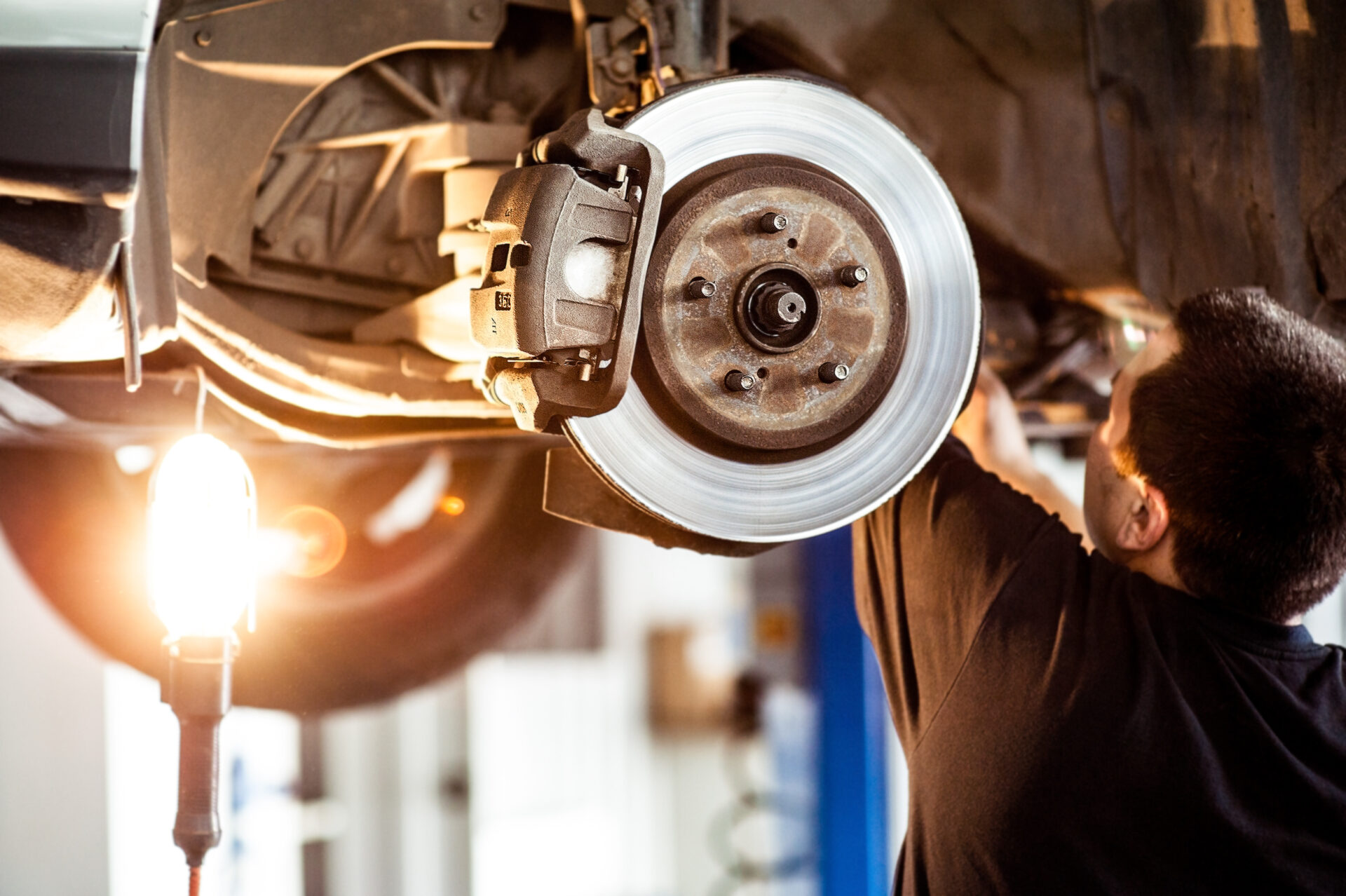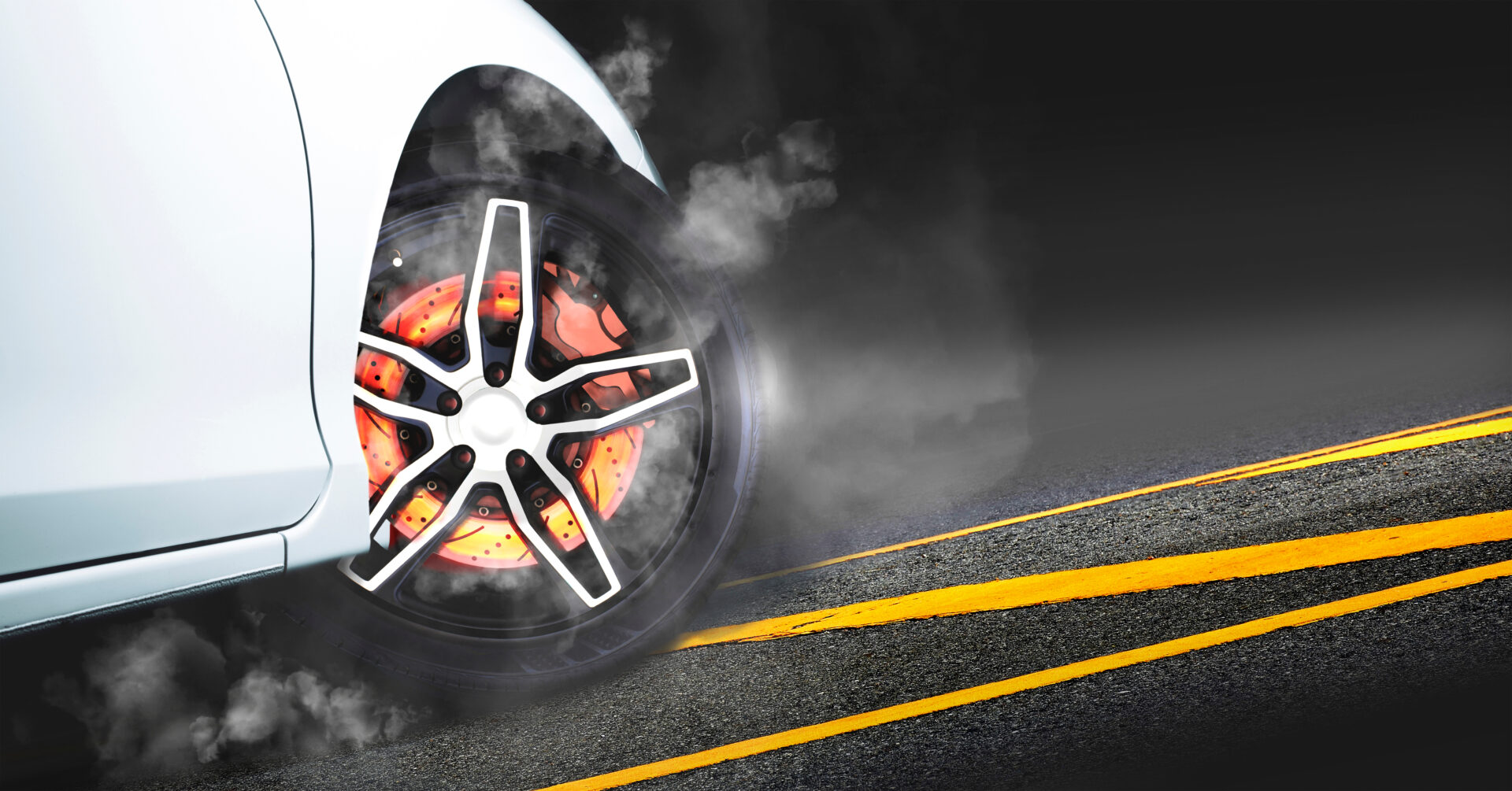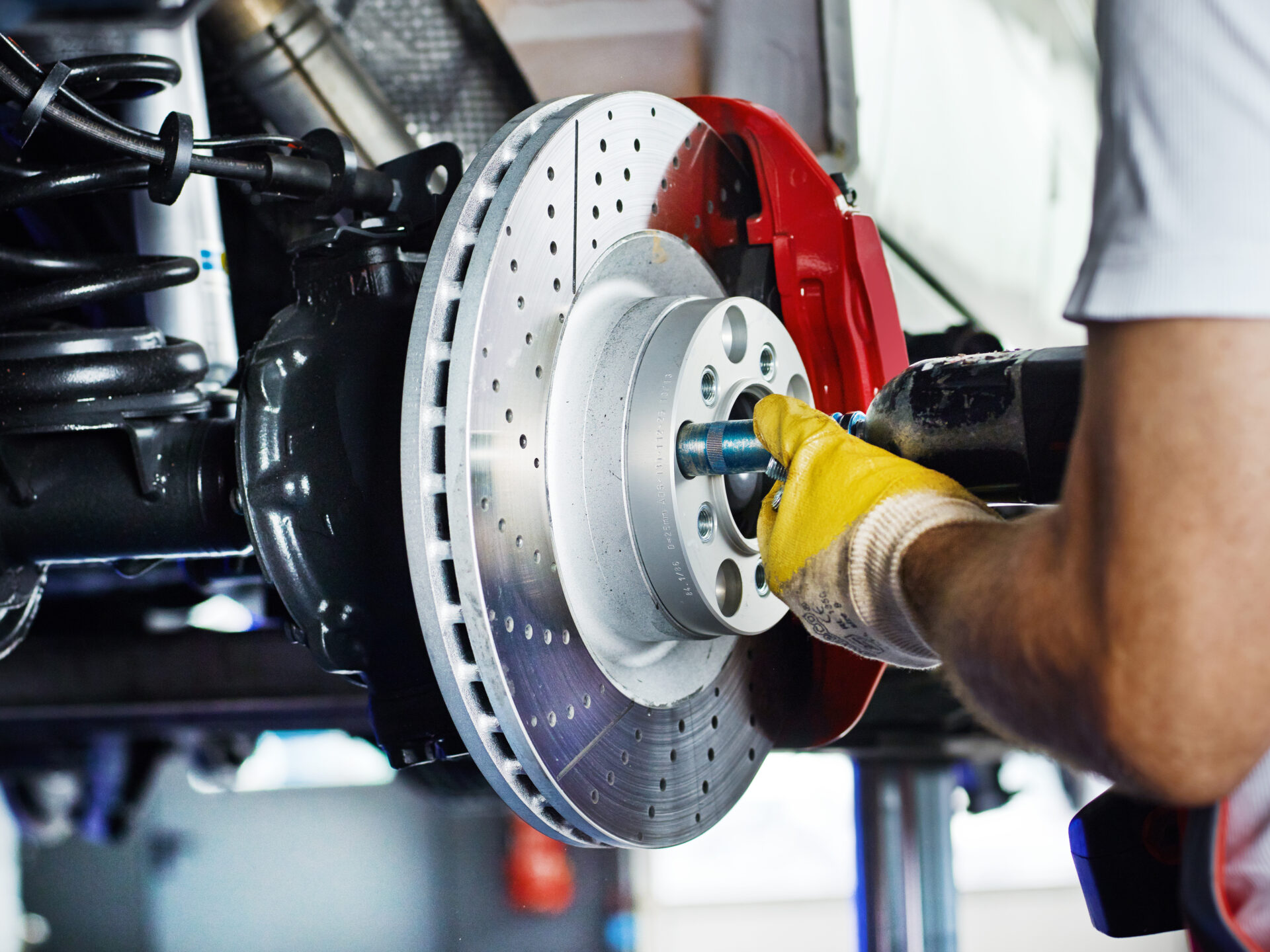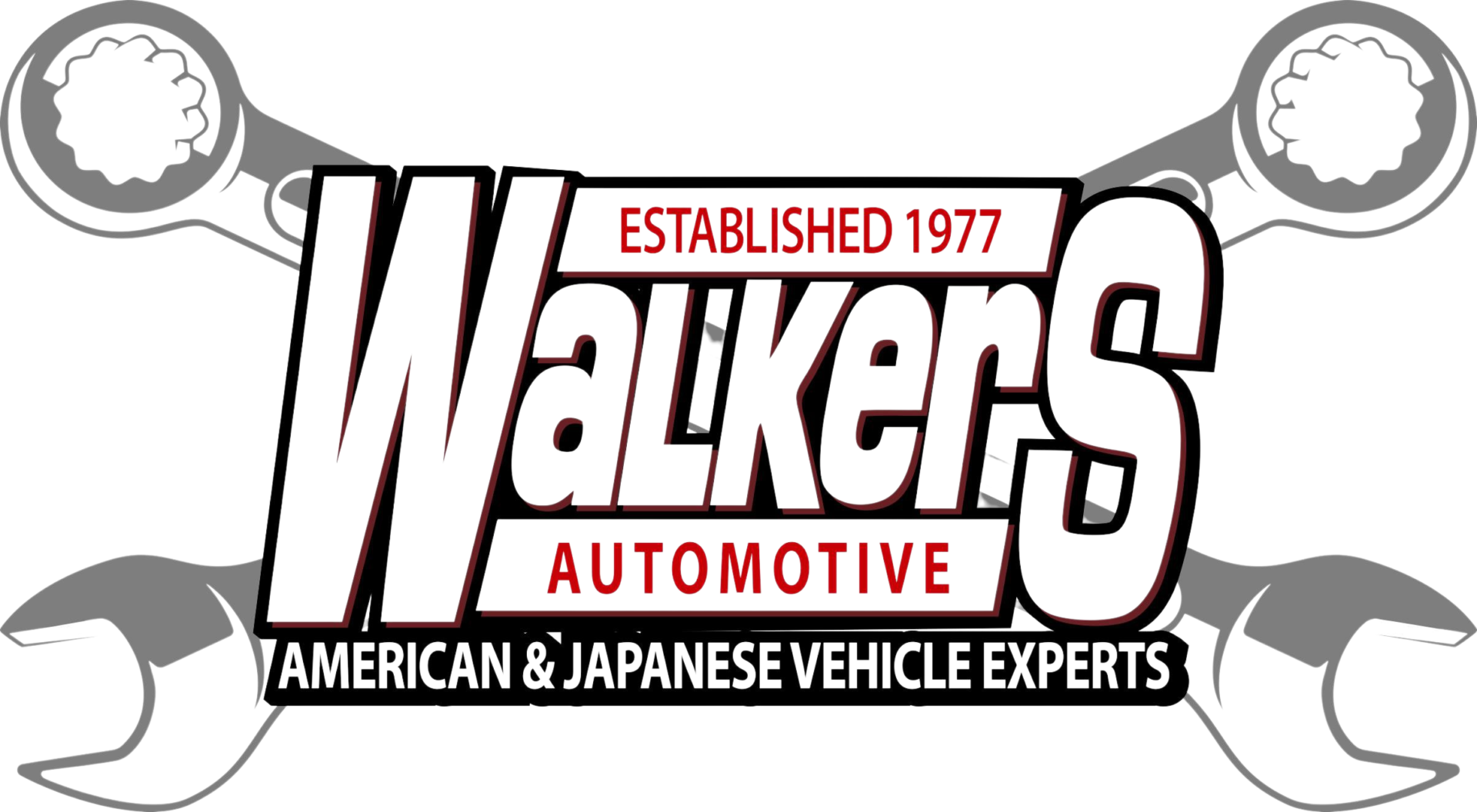Brake Repair Modesto
The safety of passengers in an automobile largely depends on the braking system. That is why all owner manuals specify a brake repair service schedule.
As strong as our brake seem to be, manufacturers do not intend for the brakes to last for the entire life of the vehicle. All vehicles driven long enough will eventually need brake repair.
Get a Fast Free Quote!
Several factors contribute to the life of a vehicle’s braking system.
For instance, if you commute 30 miles each direction all on the freeway. You are doing little braking so your brakes will most likely last longer. However, if you are dropping kids off at school, picking them up, going to practices and lessons. You are doing a lot more stopping and going so you will have more wear on your brakes.
Another factor is the type of terrain owners drive the car on. Mountain driving is going to cause more wear than a flat road. The type of vehicle, the number of miles driven and the quality of the brake parts is also a factor.

Mechanics can detect many minor problems before they cause damage that is more extensive.
This is why Walker’s Automotive suggests you bring your car in if you suspect there may be an issue with your braking system. We also check your brakes when performing scheduled maintenance to keep you from having issues on the road.
There are a few warning signs that you can look out for to know if your vehicle needs a brake repair service.
Here are common signs that indicate it’s time to have your brake pads replaced:
Squeaking or Squealing Noises: High-pitched squeaking or squealing sounds when you apply the brakes are a common indicator that your brake pads are worn down. Many brake pads come equipped with a wear indicator—a small metal tab that makes contact with the brake rotor when the pads are near the end of their life. When you hear these sounds, it’s a clear sign that it’s time to replace the brake pads:
Grinding Noise: If you hear a grinding noise when applying the brakes, it typically means that the brake pads have worn down completely, and the metal backing is now in direct contact with the brake rotor. This is a severe issue that requires immediate attention, as driving with metal-on-metal contact can damage the rotor and other brake components.
Reduced Brake Response: If you notice a decrease in the responsiveness of your brakes, it may be a sign of worn brake pads. When the pads are thin, they may not generate enough friction to stop the vehicle effectively. Reduced brake response can compromise your ability to stop quickly and safely.
Vibrations or Pulsations: If you feel vibrations or pulsations through the brake pedal when applying the brakes, it could indicate uneven wear on the brake pads. This can lead to an inconsistent braking experience and may suggest that the brake pads are no longer providing a smooth and even surface against the rotor.
Dashboard Warning Light: Some modern vehicles are equipped with dashboard warning lights that illuminate when an issue is detected in the braking system. If the brake pad warning light comes on, it’s a clear indication that the brake pads need attention. Refer to your vehicle’s owner’s manual for specific details on warning lights.
Thinner Brake Pads: Inspecting the thickness of your brake pads can give you a visual indication of their condition. Many brake pads have a minimum thickness specified by the manufacturer. If the pads appear very thin or are approaching the minimum thickness, it’s time to replace them.
Burning Smell: A burning smell while driving or after braking could be a sign that the brake pads are overheating due to excessive friction. This can occur when the pads are worn down, and the metal backing is in contact with the rotor. Overheating brakes can lead to reduced braking performance and potential damage to other components.
A word of caution, if you feel or hear any of these things happening and bring your car in right way. Most likely we have caught it early enough we can replace your brake pads, we may need to resurface your rotors, but it would still be a inexpensive repair. However, if you wait and we have to replace the rotors, brake fluid and other components that can add up.
So whenever you do hear or feel these issues start, give us a call so we can keep your maintenance inexpensive and you safe on the road!



Frequently Asked Questions (FAQ) About Brake Repair:
1. Q: How often should I have my brakes inspected and repaired?
A: Inspecting your brakes at least once a year or as advised in your vehicle’s owner’s manual is recommended. However, immediate inspection and repair are crucial if you notice any unusual sounds, vibrations, or reduced braking performance.
2. Q: What are the common signs that indicate my brakes need repair?
A: Common signs include squeaking or grinding noises, vibrations or pulsations while braking, reduced responsiveness, and warning lights on the dashboard. If you experience any of these issues, it’s advisable to have your brakes inspected promptly.
3. Q: How long do brake pads typically last?
A: The lifespan of brake pads varies depending on driving habits, road conditions, and the type of brake pads used. On average, brake pads may last anywhere from 30,000 to 70,000 miles. Regular inspections will help determine when replacement is necessary.
4. Q: What causes brake fluid to become low or contaminated?
A: Brake fluid can become low due to normal wear of brake components or a potential leak in the brake system. Contamination may occur over time due to moisture absorption, which can affect brake fluid performance. Regular brake fluid checks and replacements are recommended.
5. Q: How much does brake repair typically cost?
A: The cost of brake repair varies depending on factors such as the extent of the damage, the type of brake components needed, and the make and model of your vehicle. It’s advisable to get a detailed estimate from a reputable repair shop before proceeding with any repairs.
6. Q: Can I drive my car if the brakes are making noise?
A: While it may be possible to drive with noisy brakes, it is not advisable. Unusual sounds, such as squeaking or grinding, often indicate worn brake pads, and driving with compromised brakes can lead to further damage. It’s recommended to have your brakes inspected and repaired promptly.
7. Q: How long does a brake repair usually take?
A: The duration of brake repair depends on the extent of the work needed. Simple tasks like brake pad replacement may take an hour or two, while more complex repairs, such as rotor replacement or brake system overhauls, may take longer. Your repair shop can provide a more accurate estimate based on your specific situation.
8. Q: Are there differences between OEM and aftermarket brake parts?
A: Original Equipment Manufacturer (OEM) brake parts are designed and produced by the vehicle manufacturer, ensuring compatibility and performance. Aftermarket brake parts, while often more affordable, may vary in quality. Both options have their pros and cons, and your choice may depend on factors such as budget and specific vehicle needs.
9. Q: Can I do brake repairs myself or seek professional help?
A: Brake systems are critical to your vehicle’s safety, and it is recommended to seek professional help for brake repairs. Professional technicians have the expertise and tools to diagnose issues accurately and perform repairs to industry standards, ensuring the safety and reliability of your brakes.
10. Q: How can I extend the lifespan of my brake components
A: Regular maintenance, including brake inspections, fluid checks, and timely repairs, is critical to extending the lifespan of your brake components. Avoiding aggressive driving habits, such as sudden stops, and promptly addressing any signs of brake issues contribute to overall brake health.
